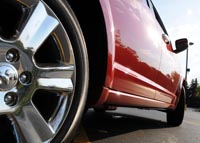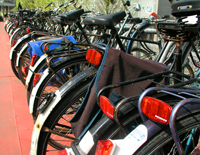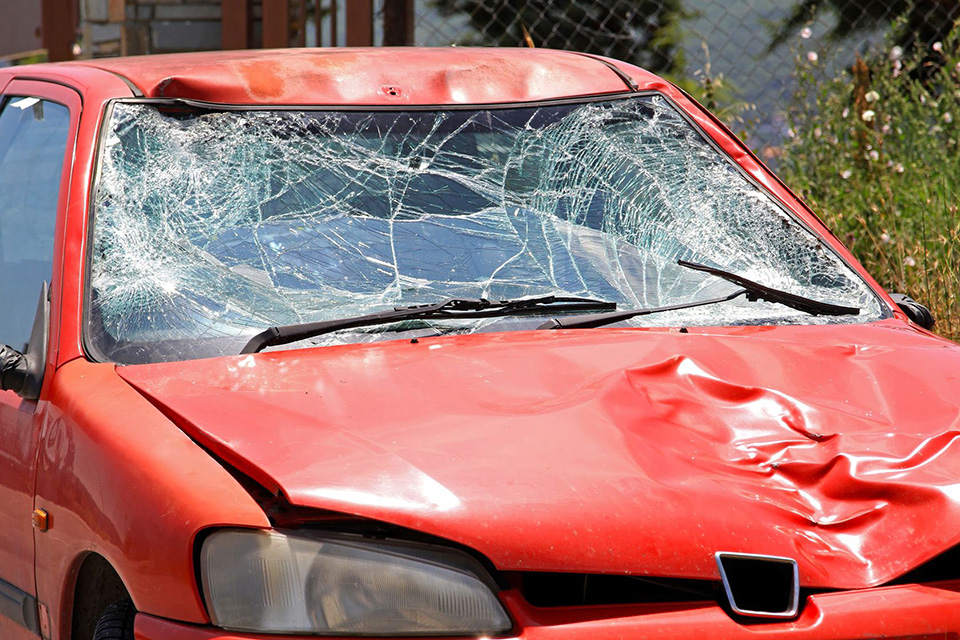Child Passenger Safety Week Highlights Need to Protect Children
 To parents, there is nothing more important than their children’s safety. In the car, safety starts with child passenger safety seats.
To parents, there is nothing more important than their children’s safety. In the car, safety starts with child passenger safety seats.
This week, the National Highway Traffic Safety Administration is observing Child Passenger Safety Week. This weekend is National Seat Check Saturday, an opportunity for parents to have their child’s safety seat inspected free of charge.
Motor vehicle accidents are the leading cause of death among children in the United States, according to the Centers for Disease Control and Prevention (CDC). Child passenger safety seats have been shown to reduce these deaths. For infants, child safety seats result in a 71 percent reduction in motor vehicle accident deaths.
All 50 states have child passenger protection laws. Violations are a primary offense in Massachusetts and 47 other states, meaning police can stop drivers solely for non-compliance. In Colorado and Nevada, child passenger safety violations are a secondary offense.
In Massachusetts, children must travel in a federally approved child passenger safety seat restraint until they are 8 years old or over 4’9″ tall.
Parents often use child safety seats incorrectly. In one study observing nearly 3,500 child safety seats, 72 percent were misused, according to the CDC. This increases the chance for motor vehicle accident injuries and deaths.
Massachusetts parents can ensure their child safety seat is properly fastened on Saturday, when police departments and not-for-profit organizations will provide free checks.
If you are a parent of a young child, click here to find an inspection station near you.
Click here for information on the Enhanced Child Passenger Safety Law in Massachusetts.
Read More
Product Liability Warnings For Blender and Antinausea Drug
Consumers want to take note of two recent product safety announcements, one involving a popular blender sold at Target stores and another concerning an antinausea drug which has been linked to a potentially fatal heart rhythm.
Defective Blender: On Sept. 15, 2011, Target Corp. and manufacturer Select Brands, Inc. announced the recall of the Chefmate(r) 6-Speed Blender. Target and the Consumer Product Safety Commission have received 11 reports of the blender’s blades separating from the pitcher. In seven cases, consumers using the recalled Target product suffered serious lacerations and injuries to fingers and hands.
Approximately 304,000 defective blenders were sold at Target stores in Massachusetts and nationwide between September 2007 and Febrauary 2011. The blenders have the model number BL-10.
Consumers are advised to return the recalled product to Target stores for a full refund or contact the store’s guest relations department at 800-440-0680.
Drug Danger: Also on Sept. 15, the Food and Drug Administration (FDA) announced clinicians should avoid prescribing the drug ondansetron to patients with congenital long QT syndrome, which is a syndrome affecting the electrical functions of the heart. These patients are at risk for developing an abnormal and potentially fatal heart rhythm called torsades de pointes.
Ondansetron is widely known as Zofran, manufactured by GlasxoSmithKline. It is prescribed to prevent nausea and vomiting experienced during cancer chemotherapy, radiation therapy and surgery.
The FDA is revising the drug’s label to warn about the risk for the heart arrythmia. It will include recommendations for electrocardiogram monitoring for patients with electrolyte abnormalities, congestive heart failure and bradyarrhythmias and for patients taking other medications.
The FDA is also requiring GlaxoSmithKline to conduct a study to determine the degree to which ondansetron may trigger the complications.
The Massachusetts product liability lawyers at Breakstone, White & Gluck are experienced in representing individuals injured by defective products, including defective medical devices and improperly used medications. If you have been injured, contact us toll-free at 800-379-1244 for a free legal consultation. You can also use our contact form.
Read More
Protecting Massachusetts Students Heading Back to School
 There is much to plan as students return to school each September. Buying new school supplies and clothes often makes the top of the to-do list, but even more important is planning how your child will travel to and from school safely.
There is much to plan as students return to school each September. Buying new school supplies and clothes often makes the top of the to-do list, but even more important is planning how your child will travel to and from school safely.
Approximately 17,000 children are sent to U.S. emergency rooms each year in school bus accidents, according to a 2006 report in the journal Pediatrics. Some 42 percent of student bus accident injuries and deaths result from crashes. But nearly 25 percent of school bus injuries occur during the everyday activity of boarding and stepping down from the bus.
There are many ways students travel to school: the school bus, parent car pools, walking and bicycling. All of these carry a risk for injuries and accidents – but this can be greatly reduced when drivers and students follow the rules of safety. Here the Boston personal injury lawyers at Breakstone, White & Gluck offer parents tips to keep their children safe:
Avoiding School Bus Accidents:
- Most Massachusetts school districts do not have seat belts on school buses, but if yours does, explain the importance of wearing one to your child.
- Instruct your child to wait until the bus is completely stopped before trying to board or exit.
- Tell your child to stand at least six feet back from the curb as the bus approaches.
- Explain to children they should never cross the street behind a bus because it may result in a pedestrian accident.
- Wait at the bus stop with young children. If you cannot do this every day, ask another parent to share the responsibility with you.
Avoiding Student Pedestrian Accidents:
- If possible, walk to school with your child. Arrange a neighborhood school walk and have parents take turns supervising.
- If your child is walking alone, explain that he or she must cross the street in the crosswalk under the supervision of a school crossing guard.
- Have your child wear bright colored clothing to avoid car accidents.
Avoiding Student Carpool Accidents:
- All children should wear seat belts. In Massachusetts, children ages five to seven or up to 4’9″ tall are required to travel in a child safety seat.
- Children under the age of 13 should ride in the back seat.
- Explain to children they should talk softly and let the driver concentrate on the road.
Avoiding Student Bicycle Accidents:
- In Massachusetts, children and teens age 16 and under are required to wear bike helmets.
- Do not allow young children to bicycle to school.
- Make sure your child has the appropriate experience on a bicycle and is familiar with traveling the route to school.
- Teach children to ride in the same direction as traffic on the right side of the road.
- Children and teens bicycling to school should wear bright colored clothing.
Surgical Mesh Complications Under FDA Review
A Food and Drug Administration (FDA) panel will begin discussing the safety and effectiveness of urogynecologic mesh products Wednesday. Surgical mesh is a medical device that is implanted into a woman during transvaginal mesh surgery.
On July 13, the FDA issued an update on a 2008 public health notification reporting complications from surgical mesh used in transvaginal mesh surgery are not rare. It also reported it was not clear that transvaginal mesh surgery is more effective than non-mesh repair of POP.
Transvaginal mesh surgery is used to treat pelvic organ prolapse (POP) and stress urinary incontinence (SUI). POP occurs when the tissues that hold the pelvic organs become weakened or stretched. SUI is a bladder condition.
In its July 13 update, the FDA reported it had received more than 3,800 reports of complications about transvaginal mesh surgery between 2005 and 2010. It urged surgeons and physicians to consider other options before performing the surgery.
Possible transvaginal mesh complications include internal mesh erosion, pain during intercourse, infection, bleeding, organ perforation and urinary problems.
The FDA warned that surgical mesh is a permanent implant that may require several surgeries to correct. Full removal of surgical mesh may not be possible.
The FDA will convene its Obstetrics-Gynecology Devices Panel of the Medical Device Advisory Committee on Wednesday and Thursday (September 8 and 9, 2011). The panel will discuss the safety of transvaginal surgical mesh for POP and SUI.
One consumer advocacy group has called for the FDA to recall surgical mesh. Public Citizen of Washington, D.C. – the organization founded by Ralph Nader – has also asked the FDA to reclassify surgical mesh so that future releases must undergo a more stringent approval process.
Other medical professionals support the procedure. A nationwide group of 600 pelvic surgeons has submitted a letter to the FDA challenging findings involving surgical mesh injuries.
Nine companies manufacture surgical mesh, including Boston Scientific and Johnson & Johnson.
If you have been injured during transvaginal mesh surgery, it is important to contact an experienced Boston medical device recall lawyer who can protect your interests as the FDA conducts its review. An attorney can advocate for you and ensure you obtain compensation for your injuries.
For a free legal consultation, contact the Boston lawyers at Breakstone, White & Gluck in Boston at 1-800-379-1244 or use our contact form.
Read More
Surgical Mesh To Be Reviewed By FDA Sept. 8-9
Following thousands of reports about serious injuries among women, a Food and Drug Administration (FDA) panel will begin examining the safety of surgical mesh on Sept. 8 and 9.
Surgical mesh is implanted during transvaginal mesh surgery, the treatment for Pelvic Organ Prolapse (POP) and Stress Urinary Incontinence (SUI). The procedure is performed to repair weak or stretched vaginal tissue, often after childbirth.
The panel’s review comes almost two months after the FDA’s July 13 public safety advisory on surgical mesh and as special interests step into the debate about a possible surgical mesh recall.
In the July 13 advisory, the FDA said transvaginal POP repair with mesh has no advantage over traditional non-mesh repair. The FDA’s finding was based on a review of scientific literature published between 2006 and 2011.
Between 2005 and 2010, more than 3,800 women had reported complications and injuries following transvaginal mesh surgery, according to the FDA.
The most prevalent complaint was mesh erosion within the body, but other injuries included bleeding, pain during sexual intercourse, organ perforation, vaginal scarring, muscular and emotional problems. Remedies include corrective surgery, hospitalization and intensive follow-up medical treatment.
On August 25, 2011, Public Citizen, a Washington D.C.-based consumer advocacy group, called for a recall of all non-absorbable synthetic material used in transvaginal mesh surgery. It also wants a reclassification of the approval process for new surgical mesh products.
The same day, a coalition of 600 pelvic surgeons submitted the FDA a letter challenging its findings about the risk for complications during transvaginal mesh surgery. The letter was obtained by the CommonHealth medical website. Among their challenges, the surgeons argued mesh erosion is not a major complication.
In 2010, approximately 300,000 women in the U.S. had surgery to repair POP, including 75,000 of whom had surgical mesh transvaginally implanted, according to the FDA.
Nine companies manufacture transvaginal mesh products, including Boston Scientific and Johnson & Johnson. Bloomberg News reported one recommendation from the FDA staff administration would require the manufacturers to submit additional safety data to regulators.
The FDA cleared 85 mesh devices to treat pelvic organ prolapse from 1992 to 2010.
Read More
Massachusetts Car Insurance Tips for College Students
 Each September, thousands of college students in Boston, Cambridge and across Massachusetts settle into campus life. And many students enjoy the extra freedom of bringing a car from home to school.
Each September, thousands of college students in Boston, Cambridge and across Massachusetts settle into campus life. And many students enjoy the extra freedom of bringing a car from home to school.
But students often make one costly mistake in the transition to college life. Students who have Massachusetts car insurance policies are required to inform their insurance companies about where the car is primarily kept. Otherwise, if there is a car accident, the insurance company might disclaim coverage, leaving the accident underinsured or uninsured completely. Students who fail to report their change of address and get into a car accident can be denied the Optional Insurance coverages on their policy.
Even if a student relocates a short distance, such as from Dedham to a dorm in Boston, he or she must inform the car insurance company where the vehicle will now be kept. The reason? Car insurance companies rate the coverage — and therefore the cost — on where the car is principally kept. If the car moves from a low-rated area (with fewer accidents) to a higher-rated area, the cost goes up. And if you are not paying the premium for the place where the car is principally kept, the insurance company has the legal right to disclaim coverage. And that can be harsh.
Optional Insurance Coverages Potentially At Risk Include:
Bodily Injury: This protects you from claims against your personal property if you cause a serious car accident.
Uninsured Auto: This coverage protects you and the people in your car if the person who causes the motor vehicle accident has no insurance.
Medical Payments: The first $8,000 in medical bills and lost wages are covered under the Personal Injury Protection (PIP), part of the Compulsory Coverage all Massachusetts drivers must purchase. Medical Payments provides policy holders extra protection for medical and health insurance.
Collision Comprehensive: If you are involved in a car accident, this coverage insures the damage to your vehicle.
Insurance issues can be very complicated, and you should not hesitate to call your agent if you have any questions.
Click here to read our article, “Understanding and Buying Massachusetts Car Accident Insurance.”
Another resource is, “Frequently Asked Questions on Auto Insurance,” by the Massachusetts Consumer Affairs and Business Regulation office.
Massachusetts Safety Tips After Tropical Storm Irene
 Now that Tropical Storm Irene has passed, residents and businesses throughout Massachusetts have started the extensive clean-up. Many remain without power.
Now that Tropical Storm Irene has passed, residents and businesses throughout Massachusetts have started the extensive clean-up. Many remain without power.
An estimated 4.5 million homes and businesses along the East Coast lost power, including 700,000 in Massachusetts, officials reported. Utility and state officials estimate it may take several days to restore power in some communities.
The storm caused 26 deaths across the country. In Massachusetts, a public works employee on his way to join recovery efforts was electrocuted Monday by a downed power line outside his Southbridge home.
From Storrow Drive in Boston to Interstate 91 in western Massachusetts, many roads were shut down by flooding. Residents in several communities were evacuated from their homes, including in several western Massachusetts towns, Southboro and New Bedford,
Whether you are cleaning up your yard, driving or waiting for power to be restored, it is essential to think safety for you, your family and property. Here are safety tips from the Boston personal injury lawyers at Breakstone, White & Gluck:
- Be prepared for intersections without working traffic lights or police officers to direct cars.
- When driving, travel farther behind the vehicle in front of you than normal. Road detours and single-lane roads may not be visible until just before you reach them.
- Give even more room when traveling behind tractor trailers carrying heavy loads of branches and storm debris.
- If your home is still without power, make sure you have enough flashlights and plenty of extra batteries. Avoid using candles.
- Natural gas or propane valves that have been under water should be replaced. Smell and listen for leaky gas connections that may trigger an explosion.
- If you believe there has been a gas leak, there is risk for a home explosion. Immediately leave the house, leave the doors open and contact a gas system professional before you return.
- Take measures to avoid food poisoning. Throw away any refrigerated foods that are held at above 40 degrees for more than two hours. Food can generally keep for up to 4 hours in a refrigerator that is not opened and between 24 to 48 hours in a freezer.
- Watch news reports to see if your local health department has cleared tap water for safe consumption. If you are without power and cannot watch television or access the Internet, call your town or city hall to ask.
- Watch out for and stay away from downed power lines.
- Do not enter and avoid walking near damaged buildings.
- Be careful walking under trees as there may be loose branches.
Advocacy Group Calls for Transvaginal Mesh Recall
Several weeks after the Food and Drug Administration (FDA) issued a public notice about the dangers of transvaginal mesh surgery, a consumer advocacy group is calling for the recall of all surgical mesh products used in the procedure.
Public Citizen of Washington D.C. petitioned the FDA on August 25, calling for the recall of all surgical mesh products made of non-absorbable synthetic material used in transvaginal mesh surgery. This type of mesh is used during transvaginal surgery to repair pelvic organ prolapse (POP) and Stress Urinary Incontinence (SUI). POP occurs when organs bulge into the vaginal and bladder areas. SUI is a loss of bladder control.
In 2010, approximately 300,000 women in the U.S. had surgery to repair POP, including 75,000 of whom had surgical mesh transvaginally implanted, according to the FDA.
Public Citizen is further calling for a ban on marketing all surgical mesh products made for transvaginal mesh surgery and for any future versions of the mesh to be classified as Class III medical devices. This would provide stricter approval requirements.
Nine companies manufacture transvaginal mesh products, including Boston Scientific, Johnson & Johnson, C.R. Bard, Tyco Covidian and AMS.
On July 13, the FDA issued an urgent public notice on the medical devices after receiving thousands of reports about painful complications. The notice updated a public health notification issued on October 20, 2008.
The agency reported it had received over 2,800 reports of complications between January 2008 and December 2010. It said serious complications associated with surgical mesh for transvaginal repair of POP are not rare. It advised healthcare providers that in most cases, POP can be treated successfully without mesh surgery.
Finally, the FDA said mesh surgery should only be chosen after health care providers and patients carefully weigh out the risks and benefits over other options.
In September, the FDA will convene a panel to make recommendations for transvaginal mesh surgery.
Complications from transvaginal mesh surgery include vaginal mesh erosion, infection, bleeding, pain during sexual intercourse, organ perforation, urinary problems, vaginal scarring and neurovascular muscular problems. Remedies include surgery and hospitalization.
Public Citizen issued the petition along with a professor of obstetrics and gynecology at Washington University in St. Louis and a urologic surgeon specializing in female urology and POP at the Mayo Clinic in Rochester, Minn.
The Boston product liability lawyers at Breakstone, White & Gluck are experienced in handling cases involving defective medical devices and dangerous medications. If you have been injured by transvaginal mesh surgery, contact us today for a free legal consultation. We can be reached at 617-723-7676 or use our contact form.
Cambridge and Somerville Ranked Among Top U.S. Cycling Cities
 Local cyclists have long known Cambridge and Somerville offer some of the best riding in Greater Boston. But a popular website now says they are among the foremost biking destinations in the nation.
Local cyclists have long known Cambridge and Somerville offer some of the best riding in Greater Boston. But a popular website now says they are among the foremost biking destinations in the nation.
The Street.com recently released its 10 Best U.S. Bike Cities of 2011 list, naming Cambridge the fifth best bicycling city and Somerville the ninth. Boulder, Colorado was the leader.
Cambridge was praised for the strong network of bicycle lanes and shared lane space along the Massachusetts institute of Technology (MIT) campus and nearby technology companies, such as Genzyme, Sanofi Aventies, Biogen Idec and Akamai.
Cambridge bicyclists make up 8.5 percent of the city’s population. The city has several bike shops. Cambridge Police are active in educating the public about taking steps to prevent bicycle accidents. The Cambridge Bicycle Committee has been working to improve safety conditions and reduce bike accidents since 1991.
Somerville was recognized for its bicycling infrastructure and the strong community support for bicyclists. Some 5 percent of the city’s residents are cyclists. Many riders are college students, who account for 16 percent of the population. The city neighbors Medford, home to Tufts University, and Cambridge, where Harvard University, MIT, Leslie University and Cambridge College are all based.
Somerville was praised for its “walkable, accessible squares,” and bicycle-friendly businesses, which offer Tour de France specials, bicycle valet services and benefits for local bike groups. Businesses also host an annual bike party that shuts down a portion of Davis Square.
Somerville has several bike shops and formed the Somerville Bicycle Committee in 2001. The committee has overseen development of new bike lanes, sharrows and multi-use paths to prevent bicycling accidents and personal injuries. It has also guided the development of on-street bike parking in corrals and the ongoing installation of bike racks.
To read the 10 Best U.S. Bike Cities of 2011 report, click here.
Click here to learn more about Massachusetts bicycling laws.
Read More
Massachusetts Drivers Not Stopping for School Buses
 A new pilot program shows drivers in three Massachusetts communities are failing to stop for school buses, a violation of state law and a safety concern as students prepare to head back to school.
A new pilot program shows drivers in three Massachusetts communities are failing to stop for school buses, a violation of state law and a safety concern as students prepare to head back to school.
The program is underway in Medford, Quincy and Seekonk, where school buses have been equipped with video cameras behind the vehicle’s long stop-sign arm. The cameras capture the license plates of cars which violate the law and cause school bus accidents.
In Medford, the cameras captured 112 motor vehicle violations in 105 days, according to The Boston Globe. Some 57 violations were recorded over 55 days in Quincy while Seekonk had 45 violations over 53 days.
Under Massachusetts law, drivers cannot be issued citations based solely on video evidence. A police officer or bus driver must observe the violation and testify to it. Fines start at $250 and drivers with two or more offenses can have their license revoked.
Massachusetts is one of many states that allow traffic cameras, but they are currently only used to catch toll-evading drivers on the Massachusetts Turnpike. Proposed legislation aims to prevent school bus accidents by allowing cities and towns to submit video footage as evidence.
Drivers can keep children safe and avoid motor vehicle citations by paying close attention this September. The Boston personal injury lawyers at Breakstone, White & Gluck offer these safety tips to prevent school bus accidents:
- State law requires drivers to stay at least 100 feet behind a school bus at all times.
- Drive slowly and watch for children walking in the street, especially in areas with no sidewalks.
- Watch for children playing at bus stops.
- Yellow flashing lights signal the bus is slowing down to stop.
- Red flashing lights and an extended arm indicate the bus is stopped to let children on or off.
- Do not start driving again until the stop arm folds back up and the bus starts moving.
- Do not attempt to pass a school bus.
- Watch for children when backing out of your driveway. If you see children, ask them to move to the sidewalk until you drive away.
Click here for the state law on driving near school buses in Massachusetts.
The Massachusetts motor vehicle accident lawyers at Breakstone, White & Gluck are experienced in handling all types of traffic cases, including school bus accidents, pedestrian accidents and crosswalk accidents. Contact their Boston office today.


